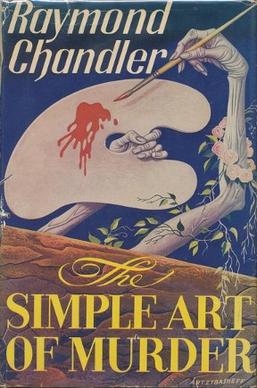 |
| St. Raymond in a typical funny mood |
That's for Chandler the Writer - but Chandler the Critic is held in just as high an esteem, though his fame rests on a single work, his famous essay The Simple Art of Murder. I'd be a billionaire had I been paid a nickel each time I read or heard someone quoting approvingly from it - the passages about realism in fiction, the Venetian vase, and the not-too-fragrant world we live in being particularly popular. Wikipedia, always to be trusted to reflect the received wisdom of the day, calls it a "seminal piece of literary criticism" and goes on to put Chandler on the same foot as Mark Twain. Unlike Chandler's fiction the piece actually generated some heated response at the time and later but you won't find a mention of it on the Wikipedia page because as I said above Wikipedia always reflects the consensus - and said consensus is that Chandler was right, his critics were wrong, and he single-handedly destroyed the traditional mystery by showing how phony and clichéd it was. Ite missa est.
 |
| The Book |
What are we to do then? Writing one more rebuttal, however well-argued and backed by evidence, will not suffice. We must let the books speak for themselves. As Golden Age mysteries are becoming widely available again and prove popular with readers, the old clichés will become ever harder to sustain, no matter how hard some desperate cases cling to them. We may never convince the noirheads, but the rest will hopefully realize that there is more to the traditional mystery than its caricature as being out of touch, artificial and boring. Crime, in its fictional form, is definitely not a simple art. It's time to move on from Raymond.
Further reading:
A rather harsh and thoroughly unfair - and thus exhilarating - review of The Big Sleep.
8 commentaires:
Xavier - What can I say but that you've nailed it perfectly. I've always found Chandler's careless plotting to be his worst characteristic; certainly the man could write and write well, but as I've asserted previously, in a detective fiction work plot is PRIMARY while the other aspects, e.g. style and characterization, are SECONDARY, the reverse of a mainstream writer's concerns. When done well, as Chandler demonstrated, style, characterization, etc. can become delightful lagniappe, but they will never replace a solid, coherent plot. - Mike
Hello Xavier... I think the link to The Big Sleep review is incorrect... it keeps taking me to Ripley’s Wiki page.
Hello James,
The link was indeed incorrect, I have fixed it and it should work now. Thanks for noticing (and reading)!
Hear, hear! An over-rated writer, with a thoroughly pernicious influence on authors and critics alike.
His plots lack focus; they're loosely-woven set-pieces, rather than a coherent narrative.
His worldview appeals to adolescents and high-brows: life is awful, the rich and powerful are in control, the police are corrupt, the women are bad, and the little man doesn't have a chance. Let us overthrow the system!
His style is over-descriptive, his sentences staccato, and his metaphors strained. For good writing, see, for instance, John Dickson Carr, G.K. Chesterton, Nicholas Blake, or Gladys Mitchell.
Besides, as has been pointed out, who says fiction ever wanted to be realistic? Believable, yes, but the fantastic can be believable. It just takes skill.
And haven't you yourself said that Chandler was the enemy of imagination?
And his notion of "realism" is limited; why should a genre be limited to the mean streets of California? Surely one of detective fiction's great points is that it can do anything, go anywhere, so long as there is a problem to solve.
Reginald Hill and Isaac Asimov set fair-play detective stories in outer space in the far future; plenty of writers have set murder mysteries in the ancient past; and no doubt there are some in fantasy. (A couple of Terry Pratchetts, I know.)
But it's received wisdom - and received wisdom has, as you say, the patina of truth. Same thing with music. Ever tried arguing with a Wagnerian? I don't recommend it; a more dogmatic, hysterical, fanatical, and close-minded bunch it's hard to find.
Oh, and I like Mike's "lagniappe"!
Correction: Anyone with power and money is corrupt and evil.
And is a Georgian mansion or a Nile cruise any less real than an America overrun by gangsters? It's an odd sort of inverted snobbery.
Your expression "noirheads" made me chuckle!
Also, I agree that having the books speak for themselves is the best way to correct misconceptions, and that this increasingly likely with old titles getting in print again. Hopefully the situation will evolve from a negative into a positive feedback loop among [greater/better] supply of high quality GAD, [enhanced] popularity (I.e., commercial success), and [renewed] critical appreciation. The success of the British Library reprints combined with the prestige of its publisher gives some reasons for optimism.
One thing I do have to say for Chandler - he was better than Hammett. Anything's better than Hammett's nihilism.
Chandler is also not as awful as, to take another example, Jim Thompson.
In fact as hardboiled writers go Chandler isn't so bad. His influence though was almost entirely harmful.
Enregistrer un commentaire